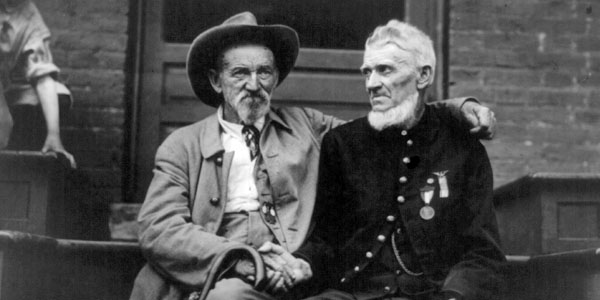
Q: My grandfather was a Civil War veteran. He fought for the Union with an Illinois regiment and was at Fort Donelson and Shiloh. He lived into his 80s and gave several speeches to his Grand Army of the Republic post. I have a couple of those speeches. They are quite eloquent. One is about President Abraham Lincoln, the other about the army. In it, he calls his army the “Army of the Rebellion.” Yet the speech is clearly about the Union army.
This puzzles me. Was it ever referred to as the “Army of the Rebellion”? The speech has been typed up, so an error could have been made by the typist. Grandfather could have misspoken. So far I have found only a few references to the “Army of the Rebellion.” But in each case the reference is clearly to the Confederate army. Thanks for any help you can give me.
— George F. Day
Waterloo, Iowa
A: There’s no reason to doubt that Mr. Day’s grandfather intended to refer to the Union army as the “Army of the Rebellion.” In the postwar years, it was quite common for Union veterans to use that label for their own forces. Its exact genesis is lost to history, but it likely arose from Union men referring to themselves as being in the army that was dealing with the Southern insurrection, or “rebellion.” The reference took, and was then simply spread informally, by word of mouth.
When it began to appear in print it was almost always lowercased: The phrase “army of the rebellion” appeared in newspaper articles, political endorsements, reports from Grand Army of the Republic posts, veterans’ reminiscences, advertisements, and the Army and Navy Journal, the unofficial organ of the Regular Army.
Endorsing Rutherford B. Hayes for president, a former subordinate said that the “grand volunteer army of the rebellion produced few, if any, better regiments” than Hayes’s 23rd Ohio Infantry.
Writing of Union major general John A. Logan after his death, several newspapers called him “the foremost volunteer officer of the army of the rebellion.”
And if you sought a sure remedy for “La Grippe and Catarrhal diseases,” a 19th-century advertisement gushed, you need only have tried Pe-ru-na, which was heartily endorsed by the Sisters of St. Francis and the Honorable Josiah B. Allen of the Supreme Court of Ohio, who “was a captain in the army of the rebellion, where he lost an arm.”
Peter E. Cozzens, a career officer with the U.S. State Department, has written 16 histories, including Shenandoah 1862: Stonewall Jackson’s Valley Campaign.
Anything about military history you’ve always wanted to know? Submit your question to us at MHQeditor@weiderhistory.com. You can even suggest the expert you’d like us to query.





